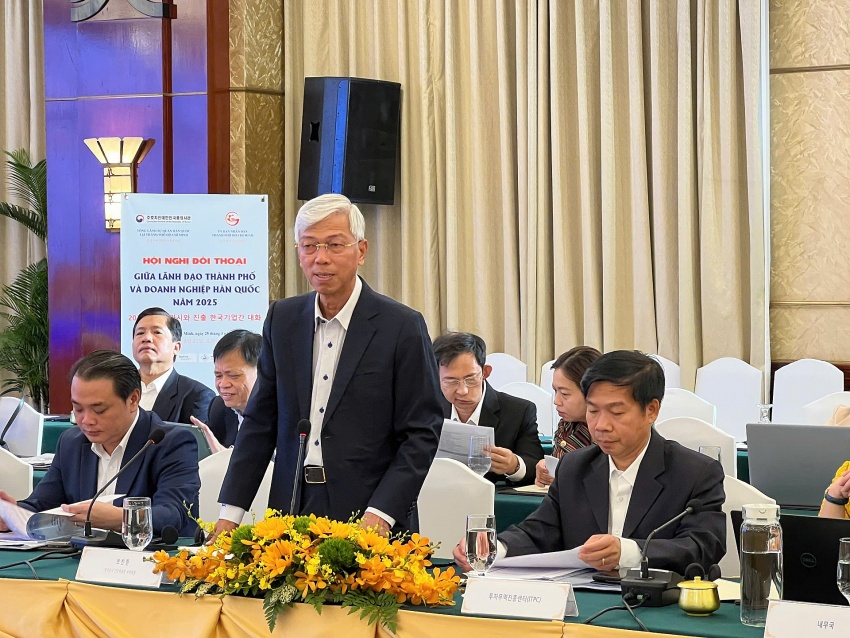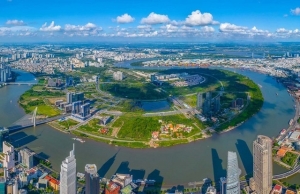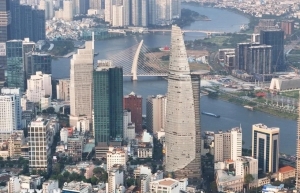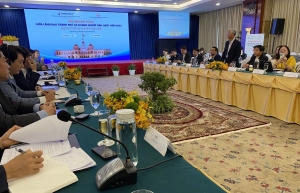South Korean investors express interest in developing IFC in Ho Chi Minh City
At a meeting between Ho Chi Minh City leaders and South Korean enterprises held in Ho Chi Minh City on March 25, Michael Jaewuk Chin, independent director of Vingroup, shared South Korea's experience in building an IFC in South Korea.
“We would like to emphasise three factors: building financial infrastructure, reforming regulations, and innovating technology (digital banking, mobile finance, blockchain),” Chin said.
To promote Vietnam-Korea cooperation in the financial sector, Chin proposed implementing a green bond system, a joint carbon credit trading project, and cooperation in renewable energy development.
“Green finance is the key for Ho Chi Minh City to become an IFC and will create momentum for the sustainable development of both countries,” Chin said.
 |
| Vo Van Hoan, Vice Chairman of Ho Chi Minh City People's Committee, shared information about international financial centre development plan with South Korean investors. |
Do Dang Ai, deputy director of Ho Chi Minh City Department of Finance, said that as of January 31, South Korea was the third-largest foreign investor in Ho Chi Minh City with more than 2,280 projects worth of $5.5 billion.
Towards the future, the city will focus on developing high-tech industries, support services, and building an IFC and Digital Technology Centre.
“The city is also focused on attracting investment in the form of public-private partnerships in infrastructure, healthcare, education, culture, and sports, while continuing to implement solutions to improve the investment environment, reform administrative procedures, and support businesses,” Ai said.
Nguyen Truc Van, director of Ho Chi Minh City Centre for Socio-Economic Simulation and Forecasting, shared that the plan to establish an International Financial Centre in Ho Chi Minh City includes three phases: national financial centre (2025-2030), regional financial centre (2031-2035), and international and global financial centre (after 2035).
“The focus of the plan is to develop core financial services, attract a diverse financial business ecosystem, and build Ho Chi Minh City into a fintech destination in the region,” Van said.
She also mentioned the formation of two financial districts in District 1 and Thu Thiem, and called on large financial institutions, technology enterprises, and strategic investors to participate.
“By setting up the centre, Ho Chi Minh City plans to contribute to realising Vietnam's goal of zero-net emissions by 2050,” she said.
Currently, Ho Chi Minh City is considering the option of developing the centre in District 1 and Thu Thiem New Urban Area over the Saigon River.
“These two districts will complement each other with traditional financial services still concentrated in the existing financial district, and innovative financial services will be concentrated in the new district,” Van said.
Vice Chairman of Ho Chi Minh City People's Committee Vo Van Hoan said that the cooperation between Vietnam and South Korea has developed strongly over the past 30 years, especially the elevation of the relationship to a comprehensive strategic partnership from December 2022, marking a new stage of development.
"Currently, South Korea is one of Ho Chi Minh City's leading partners in trade, investment, and tourism, with a community of more than 80,000 people and more than 2,000 Korean enterprises living and working in the city. This is an important resource contributing to the development of the city and a bridge to strengthen the connection between the two countries," said Hoan.
 | Ho Chi Minh City International Financial Center to be built in Thu Thiem New Urban Area Thu Thiem New Urban Area on the Saigon River has been allocated as the site for Vietnam's first International Financial Center. |
 | Vietnam should be flexible in selecting financial center models: expert Tuan also highlighted the importance of human capital, one of the five important factors to successfully build a financial center, citing the Global Financial Centers Index, which ranks business environment, human capital, infrastructure, market development, and reputation as the key drivers of success. |
 | Korean investors raise key concerns in Ho Chi Minh City dialogue Tax refund procedures for on-site export goods, changes to port infrastructure fee standards, the need to expand facilities at the Korean International School, and simplifying investment licensing were among the main issues raised by Korean businesses at a dialogue conference held in Ho Chi Minh City on March 25. |
What the stars mean:
★ Poor ★ ★ Promising ★★★ Good ★★★★ Very good ★★★★★ Exceptional
Related Contents
Latest News
More News
- Kurz Vietnam expands Gia Lai factory (February 27, 2026 | 16:37)
- SK Innovation-led consortium wins $2.3 billion LNG project in Nghe An (February 25, 2026 | 07:56)
- THACO opens $70 million manufacturing complex in Danang (February 25, 2026 | 07:54)
- Phu Quoc International Airport expansion approved to meet rising demand (February 24, 2026 | 10:00)
- Bac Giang International Logistics Centre faces land clearance barrier (February 24, 2026 | 08:00)
- Bright prospects abound in European investment (February 19, 2026 | 20:27)
- Internal strengths attest to commitment to progress (February 19, 2026 | 20:13)
- Vietnam, New Zealand seek level-up in ties (February 19, 2026 | 18:06)
- Untapped potential in relations with Indonesia (February 19, 2026 | 17:56)
- German strengths match Vietnamese aspirations (February 19, 2026 | 17:40)

 Tag:
Tag:

















 Mobile Version
Mobile Version